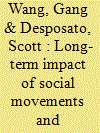| Srl | Item |
| 1 |
ID:
085458


|
|
|
|
|
| Publication |
2008.
|
| Summary/Abstract |
What shapes politicians' strategies in political systems where pork, rather than programmatic platforms, wins elections? We argue that resource control provides much of the answer, as politics in pork-centric systems will in large part be organized around actors who control access to pork. We use new national and subnational data from Brazil and Japan to show how the degree of centralization of resources can affect party affiliation patterns. We find that in decentralized Brazil, both national and subnational politicians join parties that control their subnational government. In contrast, in our analysis of centralized Japan, politicians at both national and subnational levels base their party affiliation decisions on national-level partisan considerations.
|
|
|
|
|
|
|
|
|
|
|
|
|
|
|
|
| 2 |
ID:
177615


|
|
|
|
|
| Summary/Abstract |
Democracy movements in authoritarian regimes usually fail and are repressed, but they may still affect attitudes and norms of participants and bystanders. We exploit several features of a student movement to test for enduring effects of social movements on democratic attitudes. College students were the core of the movement and had wide exposure to the ideas and activities of the movement, as well as the suppression of the movement. College-bound high school students had limited exposure to the movement and its activities. Time of college entry could in theory be manipulated and endogenous, so we also use birthdate as an exogenous instrument for enrollment year. Applying a fuzzy regression discontinuity, we test for the impact of exposure to the movement on long-term attitudes. We find significant attitudinal differences between those in college during the movement, and those who started college post-movement. These results are strongest for alumni of the four universities that were most connected to the movement.
|
|
|
|
|
|
|
|
|
|
|
|
|
|
|
|